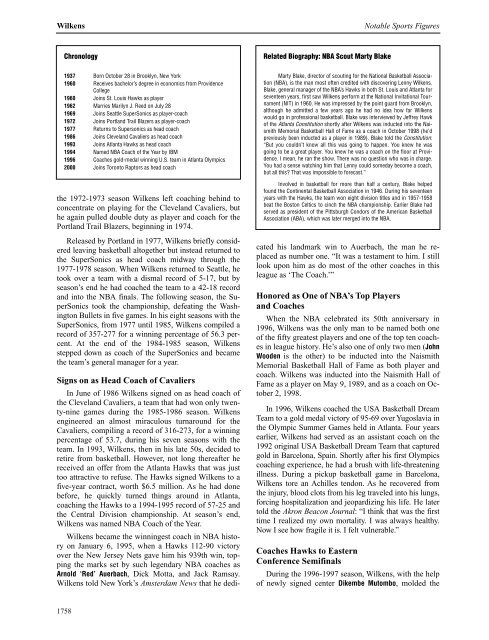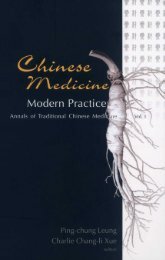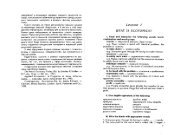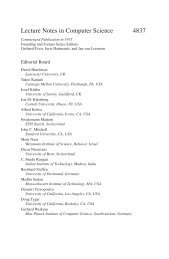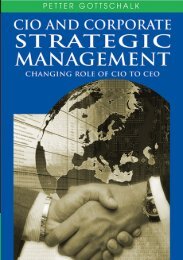Frank Thomas
Frank Thomas
Frank Thomas
You also want an ePaper? Increase the reach of your titles
YUMPU automatically turns print PDFs into web optimized ePapers that Google loves.
Wilkens Notable Sports Figures<br />
Chronology<br />
1937 Born October 28 in Brooklyn, New York<br />
1960 Receives bachelor’s degree in economics from Providence<br />
College<br />
1960 Joins St. Louis Hawks as player<br />
1962 Marries Marilyn J. Reed on July 28<br />
1969 Joins Seattle SuperSonics as player-coach<br />
1972 Joins Portland Trail Blazers as player-coach<br />
1977 Returns to Supersonics as head coach<br />
1986 Joins Cleveland Cavaliers as head coach<br />
1993 Joins Atlanta Hawks as head coach<br />
1994 Named NBA Coach of the Year by IBM<br />
1996 Coaches gold-medal winning U.S. team in Atlanta Olympics<br />
2000 Joins Toronto Raptors as head coach<br />
the 1972-1973 season Wilkens left coaching behind to<br />
concentrate on playing for the Cleveland Cavaliers, but<br />
he again pulled double duty as player and coach for the<br />
Portland Trail Blazers, beginning in 1974.<br />
Released by Portland in 1977, Wilkens briefly considered<br />
leaving basketball altogether but instead returned to<br />
the SuperSonics as head coach midway through the<br />
1977-1978 season. When Wilkens returned to Seattle, he<br />
took over a team with a dismal record of 5-17, but by<br />
season’s end he had coached the team to a 42-18 record<br />
and into the NBA finals. The following season, the SuperSonics<br />
took the championship, defeating the Washington<br />
Bullets in five games. In his eight seasons with the<br />
SuperSonics, from 1977 until 1985, Wilkens compiled a<br />
record of 357-277 for a winning percentage of 56.3 percent.<br />
At the end of the 1984-1985 season, Wilkens<br />
stepped down as coach of the SuperSonics and became<br />
the team’s general manager for a year.<br />
Signs on as Head Coach of Cavaliers<br />
In June of 1986 Wilkens signed on as head coach of<br />
the Cleveland Cavaliers, a team that had won only twenty-nine<br />
games during the 1985-1986 season. Wilkens<br />
engineered an almost miraculous turnaround for the<br />
Cavaliers, compiling a record of 316-273, for a winning<br />
percentage of 53.7, during his seven seasons with the<br />
team. In 1993, Wilkens, then in his late 50s, decided to<br />
retire from basketball. However, not long thereafter he<br />
received an offer from the Atlanta Hawks that was just<br />
too attractive to refuse. The Hawks signed Wilkens to a<br />
five-year contract, worth $6.5 million. As he had done<br />
before, he quickly turned things around in Atlanta,<br />
coaching the Hawks to a 1994-1995 record of 57-25 and<br />
the Central Division championship. At season’s end,<br />
Wilkens was named NBA Coach of the Year.<br />
Wilkens became the winningest coach in NBA history<br />
on January 6, 1995, when a Hawks 112-90 victory<br />
over the New Jersey Nets gave him his 939th win, topping<br />
the marks set by such legendary NBA coaches as<br />
Arnold ‘Red’ Auerbach, Dick Motta, and Jack Ramsay.<br />
Wilkens told New York’s Amsterdam News that he dedi-<br />
1758<br />
Related Biography: NBA Scout Marty Blake<br />
Marty Blake, director of scouting for the National Basketball Association<br />
(NBA), is the man most often credited with discovering Lenny Wilkens.<br />
Blake, general manager of the NBA’s Hawks in both St. Louis and Atlanta for<br />
seventeen years, first saw Wilkens perform at the National Invitational Tournament<br />
(NIT) in 1960. He was impressed by the point guard from Brooklyn,<br />
although he admitted a few years ago he had no idea how far Wilkens<br />
would go in professional basketball. Blake was interviewed by Jeffrey Hawk<br />
of the Atlanta Constitution shortly after Wilkens was inducted into the Naismith<br />
Memorial Basketball Hall of Fame as a coach in October 1998 (he’d<br />
previously been inducted as a player in 1989). Blake told the Constitution:<br />
“But you couldn’t know all this was going to happen. You knew he was<br />
going to be a great player. You knew he was a coach on the floor at Providence.<br />
I mean, he ran the show. There was no question who was in charge.<br />
You had a sense watching him that Lenny could someday become a coach,<br />
but all this? That was impossible to forecast.”<br />
Involved in basketball for more than half a century, Blake helped<br />
found the Continental Basketball Association in 1946. During his seventeen<br />
years with the Hawks, the team won eight division titles and in 1957-1958<br />
beat the Boston Celtics to cinch the NBA championship. Earlier Blake had<br />
served as president of the Pittsburgh Condors of the American Basketball<br />
Association (ABA), which was later merged into the NBA.<br />
cated his landmark win to Auerbach, the man he replaced<br />
as number one. “It was a testament to him. I still<br />
look upon him as do most of the other coaches in this<br />
league as ‘The Coach.’”<br />
Honored as One of NBA’s Top Players<br />
and Coaches<br />
When the NBA celebrated its 50th anniversary in<br />
1996, Wilkens was the only man to be named both one<br />
of the fifty greatest players and one of the top ten coaches<br />
in league history. He’s also one of only two men (John<br />
Wooden is the other) to be inducted into the Naismith<br />
Memorial Basketball Hall of Fame as both player and<br />
coach. Wilkens was inducted into the Naismith Hall of<br />
Fame as a player on May 9, 1989, and as a coach on October<br />
2, 1998.<br />
In 1996, Wilkens coached the USA Basketball Dream<br />
Team to a gold medal victory of 95-69 over Yugoslavia in<br />
the Olympic Summer Games held in Atlanta. Four years<br />
earlier, Wilkens had served as an assistant coach on the<br />
1992 original USA Basketball Dream Team that captured<br />
gold in Barcelona, Spain. Shortly after his first Olympics<br />
coaching experience, he had a brush with life-threatening<br />
illness. During a pickup basketball game in Barcelona,<br />
Wilkens tore an Achilles tendon. As he recovered from<br />
the injury, blood clots from his leg traveled into his lungs,<br />
forcing hospitalization and jeopardizing his life. He later<br />
told the Akron Beacon Journal: “I think that was the first<br />
time I realized my own mortality. I was always healthy.<br />
Now I see how fragile it is. I felt vulnerable.”<br />
Coaches Hawks to Eastern<br />
Conference Semifinals<br />
During the 1996-1997 season, Wilkens, with the help<br />
of newly signed center Dikembe Mutombo, molded the


